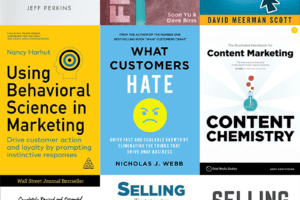Episode 68 of Yes, and Marketing
Devin Bramhall is the CEO of content marketing agency Animalz and is recognized as one of the most game-changing, charismatic leaders in the industry today. In this episode, learn why discomfort (and embracing it) has been such an important part of her career, in addition to her views on leadership and content:
- Why top of funnel traffic probably doesn’t matter
- Why measuring content effectiveness isn’t one-size-fits-all
- What it was like becoming CEO in the midst of a pandemic
- The content challenge she’s thinking about right now
- Her philosophy on developing leaders
- The definition of progress
Tap through the chapters above to listen, or read on for our highlights from the conversation. You can also watch the full interview at our show page.
Guest-at-a-Glance
Name: Devin Bramhall
What she does: CEO of Animalz.
Find Devin on the web: Animalz | LinkedIn | Instagram
Get smart: “Process is the most unsexy thing, and it’s also the most important. It’s how you achieve consistency.”
Top Takeaways
Zoom out
Devin tells how the first thing she did when she became CEO of Animalz was to take a step back. The job of a CEO, she says, is “to take as much bias and opinion out of it and say, ‘All right, what does this moment call for?’”
Zooming out and taking a broader perspective isn’t only for leaders, though. It’s also part of her strategy for dealing with the discomfort that’s an inevitable part of professional growth.
“I’m always zooming out,” she says. “If you look at it through a microscope, all you see is discomfort. If you lift your head up, you’re like, ‘Oh, I’m in a lab that’s in a research center that’s looking for the cure to this disease. That little thing in the Petri dish is just a means to an end.’” Keeping an eye on the greater mission and where you’re trying to go makes it easier to recognize discomfort as a part of life, instead of something to avoid.
Her mission at Animalz
“I want to show that you can put out excellent, top quality work and still be nice,” Devin says. Coming from a background in startups that proved the reputation “where good behavior goes to die,” Devin’s vision for Animalz is very different.
Creating a place where people “feel supported and included” and where “feedback doesn’t have to be shame” is just one piece, however. Devin recognizes that in order for that internal culture she’s creating to have an impact beyond the four walls of Animalz, the company needs to be successful.
“If the company doesn’t make money, no one cares about what I’m doing,” she explains. “It has to be a success for people in the outside world to look at what I’m doing and say, ‘Oh, I want to do that.’”
Episode Highlights
Own your own growth
“Most people don’t give enough credit to the amount of development they’ve done for themselves. I think it’s earnest and good to give credit to the people that support you along the way, and I have a long list, but I think part of making progress is owning your own growth and your own picking yourself up by your bootstraps.”
The content challenge she’s thinking about: Distribution for B2B SaaS
“Social media for B2B SaaS is broken. What’s happened is the influencer phenomenon has filtered into B2B SaaS, and now it’s people follow people at brands, not the brands.
So as an example, my friend Ashley Faus is a marketer at Atlassian. She is very active on LinkedIn and she shares a lot of stuff. She often gets more engagement than the Atlassian posts, and they’re leaning on her sometimes to get more distribution because she, as a person, has more levers at her disposal to engage in these communities and build that really engaged following.”
Why top of funnel traffic probably doesn’t matter
“I used to think that top of funnel traffic was really important, and it isn’t anymore for some companies. We talk about it like a vanity metric now, like ‘Oh, I got this many unique visitors.’… It’s kind of like saying ‘I have so many followers,’ but they’re not really your friends.
…At Helpscout famously, we had this post called ‘The Psychology of Color’ that brought in tons of traffic every month that had nothing to do with our product and didn’t convert. It was one of our worst converting posts because none of the people reading ‘psychology of color’ cared about customer service tools.”
How do you measure content’s effectiveness?
“It depends. What is your company? What is your goal? I talked to a company yesterday who is pre-product and they wanna attract people in the C-suite and also people who could potentially want to work there ‘cause they’re in a hiring stage, versus another company that’s like, ‘Okay, we need to get users real fast.’ Measurement for those two companies is completely different. And therefore how they measure not just effectiveness but quality is different.”
Process = consistency
“Process is the most unsexy thing, and it’s also the most important. It’s how you achieve consistency. It’s how you stop relying on an individual star player. And you can start to say, we are a business that can deliver quality, not just a single human.”
Biggest challenge of being a leader
“The thing about being a leader that’s one of the secretly most challenging is, you have to inspire people to keep doing that thing over and over and help them see what they’re building towards, help them see that that day-to-day stuff really matters and is making a difference and it’s helping them grow and build their career. That it’s not nothing.”
When progress looks like insanity
“Doing the same thing over and over expecting different results is the definition of insanity. But it’s also the definition of progress, right? Minus the expectations, you’re going to get better.”
Humility in content marketing
“There’s a humbleness to this job because much like a product developer, they have to create something and put a version of it out there that they know isn’t perfect, and they see what’s not perfect about it by getting feedback from people in the outside world, which is scary, right? And then make it better.
It’s similar for content marketing. We have to make some guesses. We have to do our research and talk to a lot of people and then form a hypothesis, put it out in the world, see what happens and make changes from that.”
Top Quotes
Devin:
“A lot of times the problems that people have aren’t things that can be fixed. They’re things that the product lacks.”
“One of the core tenets of content marketing is you use helpfulness to attract the people who might want to buy your product.”
“You can’t say to a creative, ‘Oh, just don’t take it personally.’ You’re going to take it personally.”
“One of the jobs of a CEO is you have to be able to take a giant step back and evaluate and see what’s going on.”
“Discomfort is only as important as you make it, so stop making it so important.”
“A business doesn’t thrive on ego.”
“Every change in content marketing has brought with it an opportunity for businesses to experiment and innovate with their content.”



